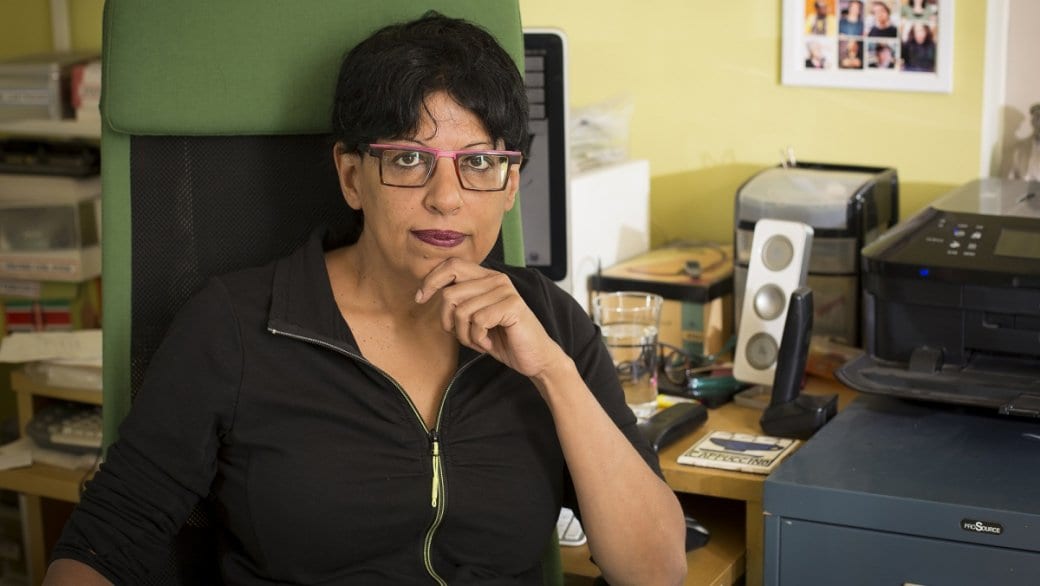The Vancouver Pride Society has not yet announced its StandOUT award nominees, but some local activists have already turned down the annual accolades.
Nominee Fatima Jaffer, founder of queer South Asian support group Trikone, says she does not know who nominated her but she will not enter the running for the Social Activist award.
Jaffer says the StandOUT awards, which replace the Pride Legacy Awards launched in 2013, seem to ignore the issues of race politics raised by groups like Black Lives Matter across North America.
“It makes us complicit with something that makes me really uncomfortable,” she says.
Black Lives Matter members have strongly opposed police presence in the Pride parade, saying it pushes marginalized queer and trans people targeted by police out of their own community’s celebration. After a sit-in at last year’s Toronto Pride parade by BLM brought these concerns to the forefront, Pride organizations in several Canadian cities banned uniformed police from the parade, and some police forces voluntarily withdrew. But Vancouver’s Pride organizers will allow some uniformed police to march, a decision that disappoints many BLM members and their supporters.
Jaffer says the nomination form email she received from the Vancouver Pride Society contains no reason for the nomination.
She questions the timing of this year’s nods to herself and other queer activists of colour.
“It’s a little suspicious, and a too-little-too-late this year kind of move in terms of why queers of colour are being reached out to,” she says.
Jaffer says she recognizes the VPS is trying to make amends with marginalized groups. But she says the VPS’s decision to allow police to march in the parade leaves her unwilling to appear aligned with their policies.
“It took a lot of lobbying and a lot of noise by the community before VPS came out with a statement about the parade,” she adds. While she doesn’t mean to discourage the VPS from recognizing activists of colour, she says more trust must be built.
Jaffer says she does not condemn anyone accepting an award or nomination; this is her personal choice, she notes.
“I think there are many ways you can approach it. I am sure they have very thoughtfully made that decision to accept,” she says, adding that some recipients may want to use the opportunity to raise their own concerns.
Transgender and sex-worker activist Jamie Lee Hamilton says friends asked for her permission to put her name forward too, but she declined.

The timing seems wrong to allow her name to be submitted, she explained in a Facebook on June 1, 2017.
“I say this because the Black Lives Matter Vancouver group still believe that Pride has not adequately addressed their concerns regarding Vancouver Police and their participation in Pride,” she posted.
To accept the nomination would be a breach of solidarity with BLM, she wrote.
“I don’t want to take anything away from anyone who has been nominated, because those people have been nominated by a peer and that’s a strong show of solidarity within our community,” she explained to Xtra by phone on June 16.
But she questions valuing some people’s advocacy over others. “That’s what I always look at: there are so many people who should be up for these awards who don’t receive any acknowledgement, who have worked tirelessly for decades,” she says.
Hamilton says she would like to see an indigenous/two-spirit award created, like the award for trans advocacy that was launched at last year’s Pride Legacy Awards.
“It doesn’t cost us anything to adapt but it spreads goodwill; we could do that with these awards,” she says. “Keep them the same and add another few components and open it up in a transparent way so we know how the decisions are being made.”
She also suggests that tickets to the ceremony should be reserved for low-income community members to avoid an audience filled with “elites.”
VPS co-executive director Andrea Arnot says the Pride Legacy Awards were reworked into StandOUT’s six new categories to include more activists.
“Last year we had difficulty with nominations because the original categories were very detailed and narrow and so they excluded a lot of potential people who are leaders in the community,” she says.
She says the redesign has resulted in nominees who don’t get a lot of recognition and may not have a public face.
“Broadening the categories allowed people to say this person is doing things perhaps in my school or my school district in a big way, but they don’t necessarily get the recognitions that other members of our community get,” she explains.
The StandOUT categories are: business leader, educator, environment, youth, social activist, and the Kimberly Nixon Trans Activist Contribution to Community award.
The previous Legacy Awards included: a youth award, a safe spaces award, a sexual health and HIV awareness award, a trans activist award, a sports award, an art award, a volunteer of the year award, and a lifetime achievement award.
Arnot says all nominations came from members of the community and, if accepted by the nominee, are placed in the running for the award.
The StandOUT Awards will take place Thursday, June 22, 2017, at the Roundhouse Community Centre in Vancouver.

 Why you can trust Xtra
Why you can trust Xtra


